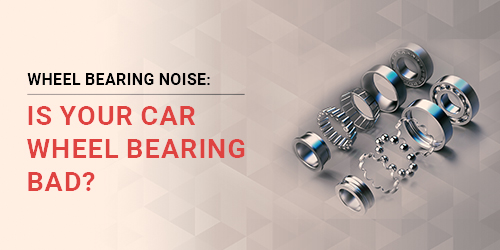You drive on a warm, sunny day and listen to your favorite song. Life seems beautiful! But suddenly, when you turn off the radio, you hear an unusual noise that coincides with the wheels’ rotation. What could this be?Well, in such cases, a bad car wheel bearing could be one of the most common possibilities.
How does a Bad Wheel Bearing Sound Like?
Most people describe a lousy wheel bearing as a howling or hissing sound (the sound is often mistaken for worn tires). Also, in some cases, a bad bearing can make a high-pitched grinding or screaming sound.

In both cases, the frequency of the sound corresponds to the rotation of the tires. The sound also increases with the increase in the vehicle’s speed (although it may pass at a certain point), and it is more detectable when your car turns in one direction.
How to tell if your car wheel bearing is bad
Your car has many rotating parts, making it difficult to distinguish a defective wheel from many other problems. Paying attention to when the noise occurs will help you to diagnose the issues.

A faulty wheel bearing will only make noise while driving. So, if you hear a sound when the vehicle comes to a stop, you can dismiss considering the wheel bearings. It is also worth recognizing that it doesn’t matter what type of road travel you make; the wheel bearings’ noise will be the same.
However, tire noise usually varies with the road surface.
In most cases, you will hear a noisy wheel bearing, whether you are accelerating or decelerating. Contrarily, some drivetrain noises, but not all of them – change as you accelerate or decelerate.
It can be hard to distinguish a flawed wheel from other problems at the end of the day. It is, therefore, essential to perform additional diagnostic work before coming to the conclusions. Otherwise, there are chances that you replace the wheel bearing unnecessary without determining the real problem.
An important thing that you must be cognizant of is that not all faulty wheel bearings make noise. Some worn bearings exhibit excessive lateral movement without making abnormal noises.
How to check for bad wheel bearings
Many other problems mimic the sound of a bad car wheel bearing. You will need to perform additional diagnostic work to ensure that one of your car’s wheels is faulty.

Some of the methods used to detect a bad wheel bearing include:
- Check the play by shaking the wheel and tire set.
- Check for roughness
- Listening to noises using a stethoscope
- Monitoring for overheating
- Check play using the dial indicator.
Signs of wheel bearing failure
You already know that the wrong wheel bearing can cause noise. But did you know that this can cause other problems as well? A bad bearing can allow the wheel housing to move excessively. Besides, the internal bearing components increase friction. As a consequence, you might observe that your car has the following problems:
- Whining/humming
- Vibration while driving
- Pulsation during braking
- Irregular or abnormal tire wear
- Illuminated warning lights

Is it possible to drive on a bad wheel bearing?
You may be wondering if you can keep driving on a bad wheel bearing. And the answer is, “big NO.” In some cases, a failed bearing can result in the wheel’s loss while driving, which can lead to fatal consequences.
So, if you think you’ve heard noises due to bad wheel bearing, don’t forget to repair your vehicle right away. Your safety depends on it.
What can happen if you have a Faulty wheel bearing?
As mentioned above, if you neglect a bad car wheel bearing, you can lose the wheel. It is the worst-case scenario, but there are other unintended consequences.

Bad wheel bearings can cause abnormal wear of the wheels, pulsation while driving, and even problems with the Anti-Lock Braking System.
So, once again, if you think you’ve got a bad wheel bearing, contact a mechanic right away or buy a bearing from The Auto Parts Shop and fix it yourself.

Nice blog